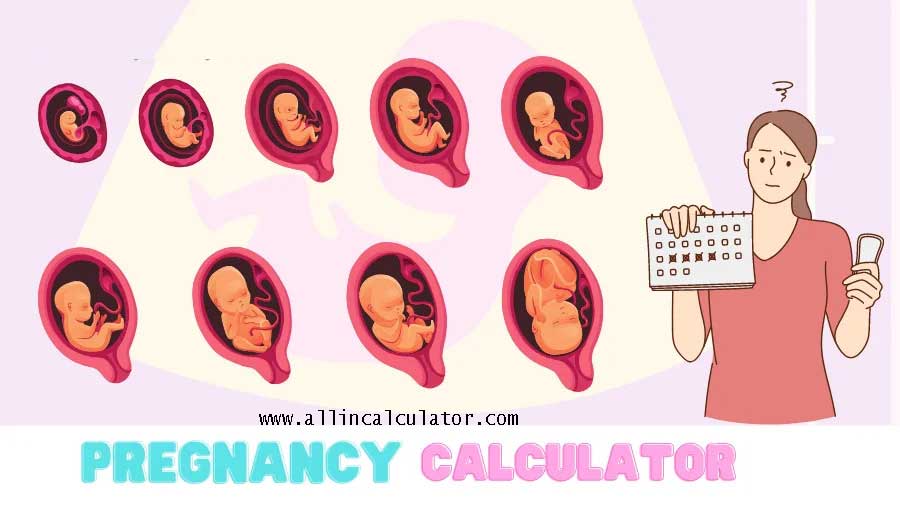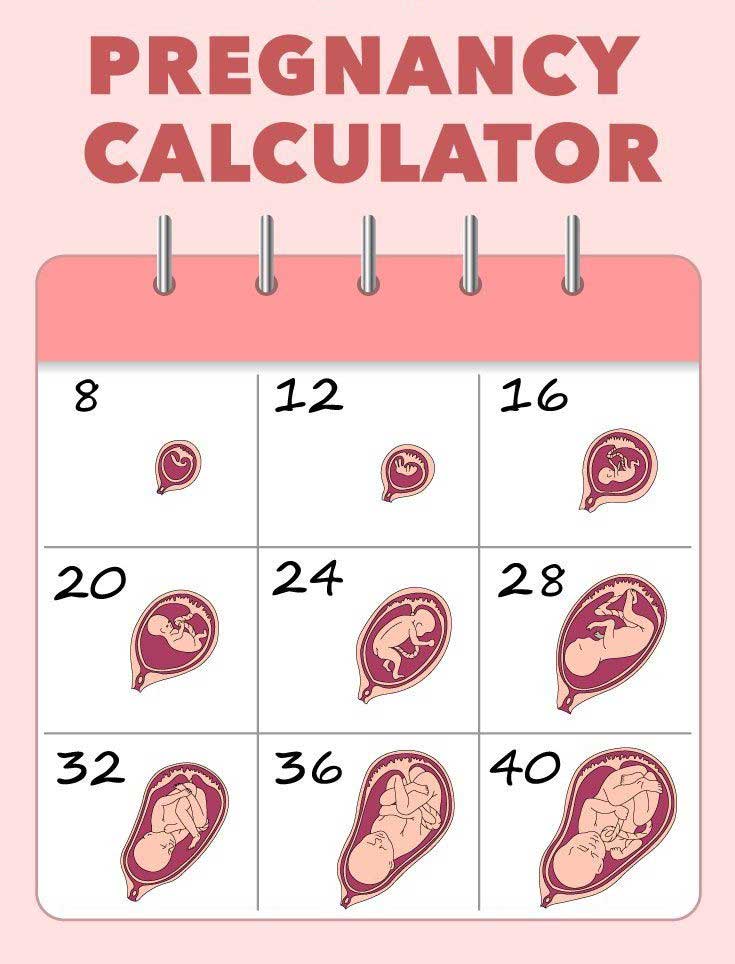Pregnancy Calendar and Due Date Calculator
Calculate Due Date from Last Period
Calculate Due Date from Conception Date
Calculate Estimated LMP and Conception from Due Date
Calculate Due Date from Ultrasound
Calculate Due Date from IVF Transfer
Pregnancy is an exciting journey, and knowing your due date can help you plan ahead. Our Pregnancy Calculator helps you estimate your baby’s arrival date and track your pregnancy week-by-week based on the date of your last menstrual period (LMP). While this tool gives you a close estimate, always consult your healthcare provider for accurate medical guidance.
Pregnancy is one of the most beautiful journeys in life, but it also comes with many questions When is my due date? How many weeks pregnant am I? Which trimester am I in? This is where a Pregnancy Calculator comes in handy. With just your Last Menstrual Period (LMP), you can estimate your due date, pregnancy week, trimester, and even track your baby’s growth week by week.
In this article, we’ll explore everything about pregnancy calculators, including Pregnancy Due Date Calculator, IVF pregnancy calculators, OB wheel calculators, pregnancy calculator by month, gender prediction tools, and more.
What is a Pregnancy Calculator?
A pregnancy calculator is a tool that estimates your due date, how many weeks pregnant you are, and what stage of pregnancy you’re currently in. It usually works based on your last menstrual period (LMP) or, in the case of IVF pregnancy calculators, the embryo transfer date.

Doctors often use an OB wheel pregnancy calculator (a circular date wheel) to determine the same information during checkups. Online versions make it much easier you just enter your details, and the tool instantly gives you results.
Why Use a Pregnancy Calculator?
Pregnancy calculators are popular because they answer common questions every expecting mother has:
- When is my baby due?
- How many weeks pregnant am I?
- What trimester am I in?
- What’s happening with my baby this week?
Having this information keeps parents prepared and reduces anxiety about the unknown. It’s especially useful if you want to plan doctor visits, maternity leave, or personal milestones like baby showers.

IVF Pregnancy Calculator – Special Case
For women conceiving through IVF (In-Vitro Fertilization), traditional calculators don’t give accurate results. That’s why an IVF pregnancy calculator uses the egg retrieval or embryo transfer date to calculate the due date.
This method is more precise, since IVF dates are medically recorded, leaving little room for error. If you’ve gone through IVF, always use a specialized calculator to get the most accurate prediction.
Pregnancy Calculator Week by Week
Many parents prefer a pregnancy calculator week by week (also written as week-by-week pregnancy calculator). It breaks down the pregnancy into 40 weeks and shows exactly what’s happening each week.
For example:
- Week 6: Baby’s heartbeat begins.
- Week 12: Major organs start forming.
- Week 20: Baby’s movements can be felt.
- Week 30: Rapid weight gain and growth.
This week-to-week pregnancy calculator approach gives you a clear idea of your baby’s development and your body’s changes.
Due Date Pregnancy Calculator
The due date pregnancy calculator is the most common type. It predicts your delivery date based on:
- LMP (Last Menstrual Period) – Add 280 days (40 weeks) to the first day of your last period.
- Ultrasound Data – Early ultrasounds provide a reliable due date.
- IVF Dates – If you conceived through IVF, use embryo transfer or egg retrieval dates.
Keep in mind: only about 5% of babies are born exactly on their due date, so it’s always an estimate.
Pregnancy Calculators in India and Local Languages
In India, many expecting parents search for tools like:
- Pregnancy calculator India
- Pregnancy calculator in Hindi
- Pregnancy calculator in Tamil
These local-language versions make it easier for families to track pregnancy in their preferred language. It ensures accessibility and comfort for everyone involved.
Pregnancy Calculator Apps
Today, you don’t need to rely only on websites. There are many pregnancy calculator apps that let you track your pregnancy week by week, set reminders for doctor visits, and even provide health tips for each stage.
Some apps are based on the American pregnancy calculator method (280-day cycle), while others adjust based on your cycle length.
Gender Prediction and Pregnancy Calculators
A trending search is due date pregnancy calculator gender prediction. While some calculators claim to predict whether it’s a boy or a girl, these are not scientifically accurate. They’re more of a fun way to engage during pregnancy.
Medical confirmation of gender is possible only via ultrasound at 18–20 weeks, and in some countries (including India), gender prediction is legally restricted.
Month-by-Month vs Week-by-Week
Some parents prefer a pregnancy calculator by month rather than by weeks. Both are useful:
- Week to Week Pregnancy Calculator: Detailed updates, useful for tracking growth stages.
- Month Pregnancy Calculator: Simpler view for easy understanding.
Both options are available in most online calculators and apps.
OB Wheel Pregnancy Calculator
Doctors still use the OB wheel pregnancy calculator, a traditional circular chart, during clinic visits. It works the same way as online calculators but requires manual calculation.
If you’re curious, you can find online OB wheel pregnancy calculator tools that simulate this process digitally.
Benefits of Using an Online Pregnancy Calculator
- Quick and easy to use
- Free and available anytime
- Tracks due date and weeks pregnant
- Offers week-by-week insights
- Available in local languages
- Helpful for both natural and IVF pregnancies
Pregnancy Management
Pregnancy is one of the most beautiful yet challenging journeys in a woman’s life. Managing it well is not just about counting weeks; it’s about ensuring both mother and baby remain healthy, comfortable, and stress-free. Effective pregnancy management involves planning, awareness, and the right lifestyle choices. Here are some key points every expecting mother should focus on:
1. Regular Doctor Visits
Why? Because routine checkups help you track your baby’s growth, monitor vital health signs, and detect any complications early. Whether it’s a natural conception or through IVF pregnancy management, medical supervision is essential.
2. Healthy Diet & Nutrition
Why? The food you eat directly nourishes your baby. A balanced diet rich in proteins, vitamins, iron, and calcium reduces risks like anemia or low birth weight. Eating right also keeps your energy levels up.
3. Safe Physical Activity
Why? Light exercises, yoga, or walking improve circulation, reduce back pain, and prepare your body for labor. Staying active helps manage weight gain and lowers the risk of gestational diabetes.
4. Rest & Sleep
Why? Adequate rest is as important as a good diet. Quality sleep supports fetal development, reduces stress, and keeps your immune system strong during pregnancy.
5. Week-by-Week Tracking
Why? Knowing your pregnancy stage helps you understand body changes, baby development, and upcoming medical needs. Tools like a week-by-week pregnancy calculator make this process easier.
6. Stress & Emotional Care
Why? A calm mind ensures a healthy pregnancy. Meditation, hobbies, or simply spending time with loved ones helps reduce anxiety. Mental health is just as important as physical health.
7. Birth & Maternity Planning
Why? Planning your delivery, maternity leave, and postnatal care in advance reduces last-minute stress. It ensures you and your family are ready for the new arrival.
Pregnancy Calculator – Some FAQs
Q:- How accurate is a pregnancy calculator?
A:- It’s quite accurate, but the actual delivery date may vary.
Q:- Can it predict gender?
A:- No, gender prediction calculators are not medically accurate.
Q:- What is an OB wheel calculator?
A:- A manual tool doctors use to estimate due dates.
Q:- How does IVF calculator differ?
A:- It uses IVF dates instead of the last period.
Q:- Can I use it in Hindi or Tamil?
A:- Yes, many regional versions are available in India.
Q:- Week by week or month by month – which is better?
A:- Both are useful; it depends on what format you prefer.